|
|
|
Sort Order |
|
|
|
Items / Page
|
|
|
|
|
|
|
| Srl | Item |
| 1 |
ID:
094689


|
|
|
|
|
| Publication |
2010.
|
| Summary/Abstract |
What explains the effect of external intervention on the duration of civil war? The literature on intervention has made some progress in addressing this question, but it has been hindered by an assumption that states intervene in civil wars either to help one side win or to facilitate negotiations. Often, however, external states become involved in civil war to pursue an agenda which is separate from the goals of the internal combatants. When states intervene in this fashion, they make wars more difficult to resolve for two reasons. First, doing so introduces another actor that must approve any settlement to end the war. Second, external states generally have less incentive to negotiate than internal actors because they bear lower costs of fighting and they can anticipate gaining less benefit from negotiation than domestic insurgents. Through Cox regressions using data on the goals of all interventions in civil wars since World War II, this article shows that when states intervene with an independent agenda, they make wars substantially longer. The effect of independent interventions is much larger than that of external interventions generally, suggesting that the established finding that external interventions prolong civil war is driven by a subset of cases where states have intervened in conflicts to pursue independent goals.
|
|
|
|
|
|
|
|
|
|
|
|
|
|
|
|
| 2 |
ID:
192054
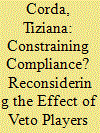

|
|
|
|
|
| Summary/Abstract |
What effect do domestic political and institutional constraints such as veto players have on the success of international sanctions which their countries have been subjected to? Do they facilitate or constrain compliance with them? Although in the literature on sanctions success the role of domestic factors has received extensive attention, a typically public-policy concept such as veto players has remained largely underexplored. The potential of its application to the literature on sanctions was only recently uncovered by sanction scholars who found empirical support for the hypothesis that the larger the size of veto players in a country under sanctions, the higher the probability of compliance. Contrary to their findings, this article theorises a negative causal mechanism whereby a growing divergence in the relevant policy-area preferences of veto players prevents the targeted country from complying with sanctions-related demands. An empirical reassessment of this relationship with George Tsebelis’ original policy-area-specific veto player data confirms this negative effect.
|
|
|
|
|
|
|
|
|
|
|
|
|
|
|
|
| 3 |
ID:
163445
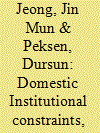

|
|
|
|
|
| Summary/Abstract |
What effect do the domestic institutional constraints in target states have on sanction outcomes? Other than the narrow focus on political regime type, little is known about how the institutional makeup of target states might affect leaders’ ability to adjust their policies to defy sanctions. We assert that the size of veto players in targets is a crucial yet overlooked institutional factor in explaining sanction effectiveness. We contend that political leaders subject to the approval of multiple veto players are more likely to concede as they are less likely to develop polices to counter the sanctions. We assess the empirical merits of our theoretical claims by combining data on sanctions from the Threat and Imposition of Economic Sanctions data set with the veto points data from the Political Constraints data set. Results from the data analysis for the 1946 to 2005 period indicate that the size of veto players is a significant predictor of sanction success even when we control for political regime type and other major political and economic covariates of sanction effectiveness.
|
|
|
|
|
|
|
|
|
|
|
|
|
|
|
|
| 4 |
ID:
177739
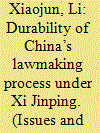

|
|
|
|
|
| Summary/Abstract |
Investment Law (FIL) after a short deliberation period of only three months. This expedited legislative process seems unusual, considering that the original draft of the FIL proposed by the Ministry of Commerce in January 2015 was tabled indefinitely after a brief period of public consultation. How can we explain this stark difference? Comparing the legislative processes and contents of the two laws, this paper shows that, as with many previous laws, bureaucratic politics likely contributed to an impasse in the 2015 draft, whereas external shocks—in this case, the escalating trade war between China and the United States—helped accelerate the deliberation process and the passage of the new FIL. These two cases demonstrate the durability of lawmaking institutions and procedures under Xi Jinping despite the recentralization of power in the executive after changes to the constitution.
|
|
|
|
|
|
|
|
|
|
|
|
|
|
|
|
| 5 |
ID:
111662
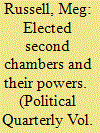

|
|
|
|
|
| Publication |
2012.
|
| Summary/Abstract |
In May 2011, Britain's Conservative/Liberal Democrat coalition government published proposals for reform of the House of Lords. In a White Paper and draft bill they set out detailed plans for a largely or wholly elected second chamber. These marked the latest stage in a long-running debate on Lords reform. The government's proposals aim to change the composition of the second chamber, suggesting that there will be no change to its powers or the conventions governing relations with the House of Commons. But this expectation has been disputed. The House of Lords presently does not make full use of its powers, and many anticipate that it would if its members became elected. This paper reviews the composition of all second chambers internationally, showing that wholly directly elected chambers make up the minority, and that both mixed chambers and indirect election are common. It then reviews the formal powers of all largely and wholly elected chambers. This shows that amongst parliamentary systems the formal powers of the House of Lords are relatively great. But second chamber powers, as well as their composition, vary widely.
|
|
|
|
|
|
|
|
|
|
|
|
|
|
|
|
| 6 |
ID:
185684
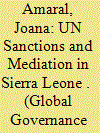

|
|
|
|
|
| Summary/Abstract |
The UN-imposed sanctions on Sierra Leone began in 1997 after the Revolutionary United Front (RUF) led a coup that forced newly elected president Ahmad Tejan Kabbah into exile. Alongside its peacemaking efforts, the UN Security Council explicitly supported the reinstatement of Kabbah, and its sanctions targeted the RUF by limiting travel and banning the trade of arms, petroleum, and diamonds. This article analyzes whether and how UN sanctions pushed the RUF to negotiate, accept, and implement agreements mediated by the Economic Community of West African States and the UN. Its findings are drawn from the qualitative analysis of official documents, memoirs, and interviews with key negotiators. It adds to the inclusion debate in peace mediation literature by discussing whether the coordinated use of sanctions and mediation can resolve the difficulties inherent in including veto players in peace negotiations.
|
|
|
|
|
|
|
|
|
|
|
|
|
|
|
|
| 7 |
ID:
102506
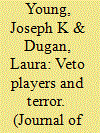

|
|
|
|
|
| Publication |
2011.
|
| Summary/Abstract |
Democratic regimes have been linked to terrorism for contending reasons, with some scholars claiming democracy increases terrorism and others claiming it decreases terror. Corroborating evidence has been used for both relationships leading to the following puzzle: why do some democratic regimes seem to foster terrorism while others do not? We offer an explanation based on Tsbelis's veto players theory. Beginning with the assumption that terror groups want to change government policy, we argue that the more veto players present in a political system, the more likely the system is to experience deadlock. Given the inability of societal actors to change policies through nonviolent and institutional participation, these systems will tend to generate more terror events. We also explore different methods for estimating terrorism models. We identify several ways to match the data with the proper statistical estimator and discuss implications for terrorism research. Finally, we use new data from the Global Terrorism Database (GTD) that was previously unavailable. These data allow us to use different operational definitions of terrorism and to identify homegrown terror events.
|
|
|
|
|
|
|
|
|
|
|
|
|
|
|
|
| 8 |
ID:
107652
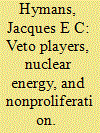

|
|
|
|
|
| Publication |
2011.
|
| Summary/Abstract |
The basic insight of the "veto players" literature from comparative politics-the more veto players, the more policy rigidity-has been nearly absent from the study of nuclear proliferation. Yet, when states need mutual agreement among a large number of veto players, this greatly lengthens the odds against radical nuclear policy change. The veto players perspective helps to explain the historical resilience of Japan's fifty-year pursuit of a complete nuclear fuel cycle for exclusively peaceful purposes. Although a long line of Japan observers have focused on statements by Japanese politicians suggesting the possibility of redirecting some of the country's large nuclear estate toward military ends, Japan's traditional nuclear policy has in fact become increasingly entrenched over the years, given the rising number of institutionalized veto players in its nuclear policymaking arena. This point is relevant not only to the long-standing question of whether Japan will acquire nuclear weapons, but also to the post-Fukushima disaster question of whether Japan will exit the nuclear field entirely.
|
|
|
|
|
|
|
|
|
|
|
|
|
|
|
|
|
|
|
|
|